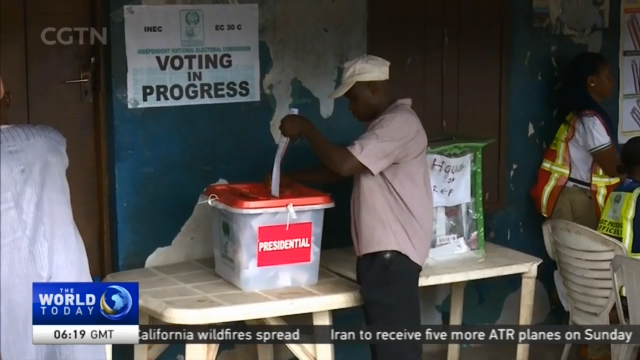
14:39, 05-Aug-2018
Nigeria Presidential Election: At least 46 politicians to challenge Buhari in February 2019 vote
Updated
13:32, 08-Aug-2018
03:57

Nigerians will head to the polls next February to pick a new president. And at least 46 politicians have indicated their intention to challenge leader Muhamadu Buhari for the seat. Deji Badmus reports.
To get the sense Nigeria might be dealing with a very crowded field of presidential candidates in February 2019 presidential election, you need to take a look at the number that contested for the position in 2015. They were fourteen. But this time, with just around 200 days to the next presidential election, at least 46 politicians have clearly indicated they would be on the ballot. It all boils down to one thing: Nigerians will be spoiled for choices in 2019.
ONYEKACHI UBANI LAWYER "If they all come together and say let's present a more formidable person that can run against the incumbent, if the president is going to run, that would probably reduce the number of aspirants that will run for the presidency but if all of them want to run individually on their different political platforms, it is possible that we may likely witness the highest number of presidential aspirants ever in the history of Nigeria."
Most of those who make up the current crowded field of presidential candidates are young people in their thirties. It's actually the first time since 1999 that Nigeria would be having a huge number of young people show interest in the country's top political office. While part of that can attributed to a new law reducing the age for some political offices like that of the presidency and parliament, some analysts say Nigeria's youths are drawing inspiration from other places.
NYEN EKPANG POLITICAL ANALYST "Nigerian youths are looking at countries like France with a young president; Canada, where everybody wants to go and study, young president also. And of course the finals of the world cup where Croatia and France played. And of course you saw the two leaders, young people come up. It trended all over the social media in Nigeria. So people are thinking, if it's possible to have a young president, the dynamics of the country could change for the better."
That number of presidential candidates may likely go up when you consider the fact there are 68 registered political parties in the country at the moment and more are still being expected to be registered by the country's election regulator, INEC before the election. The situation has sparked debates as to whether the country needs to put a check to the rising number of political parties.
EZENWA NWANGWU CIVIL SOCIETY LEADER "You cannot say they can't exist by law. That will be anti democratic and it will be infringing on the rights of citizens but INEC needs to do the necessary hard work of working through some kind of mechanics that will help to determine how you appear on the ballot."
It's not just the presidential field that is crowded as a result of more political parties. A record number of candidates are also gunning for various political positions like parliament, governorship and state parliaments as well. It all means more work for the INEC and of course more expenses.
ANTONIA TAIYE OKOOSI-SIMBINE HEAD OF NIGERIA'S INDEPENDENT ELECTORAL COMMISSION "An ordinary A4 paper where you could write a list of the political parties before on page, you can no longer do that. So you can see that you then would need two pages or three to then be able to do this not to speak of when you now come to the election proper."
DEJI BADMUS LAGOS, NIGERIA "There is a chance that the field of candidates may shrink as we move closer to the election. The main opposition PDP for instance is hoping to firm up its coalition with over thirty political parties to put forward one presidential candidate. The ruling APC may make a similar move in the coming weeks. So that might bring down the number. But there is every likelihood that the eventual number could be higher than the fourteen that vied for the Presidency in 2014. It's still a game of wait and see.Deji Badmus, CGTN, Lagos, Nigeria."

SITEMAP
Copyright © 2018 CGTN. Beijing ICP prepared NO.16065310-3
Copyright © 2018 CGTN. Beijing ICP prepared NO.16065310-3